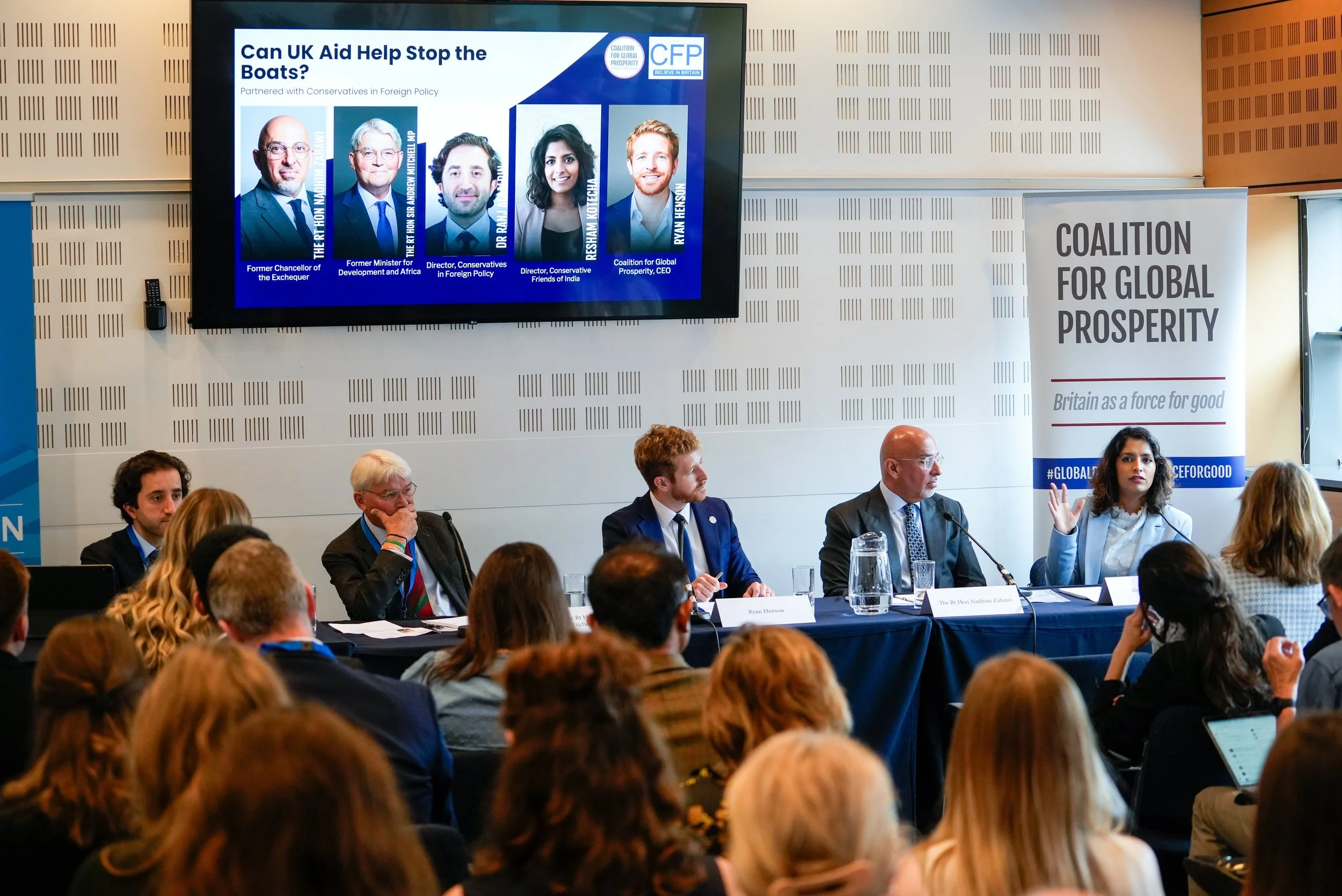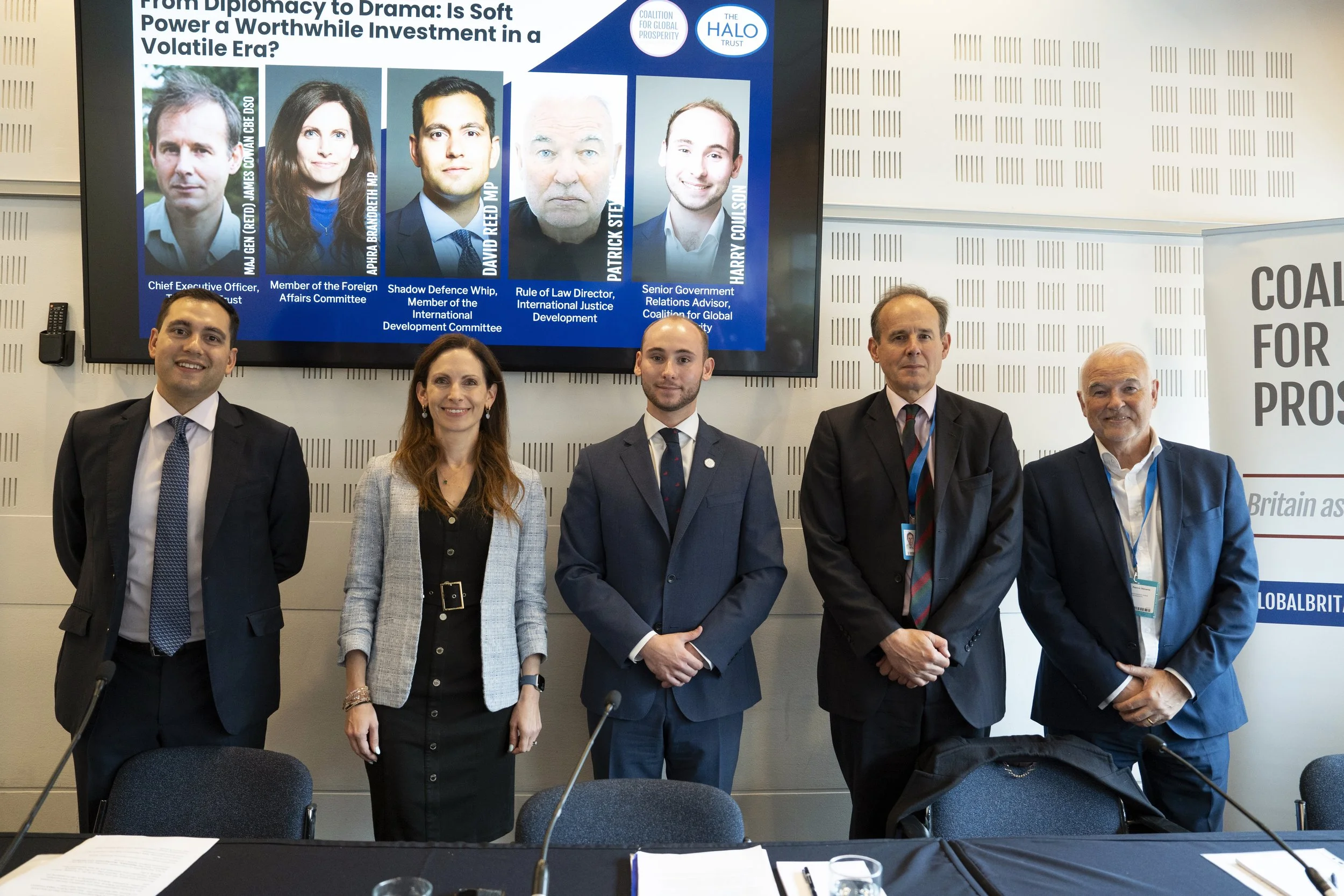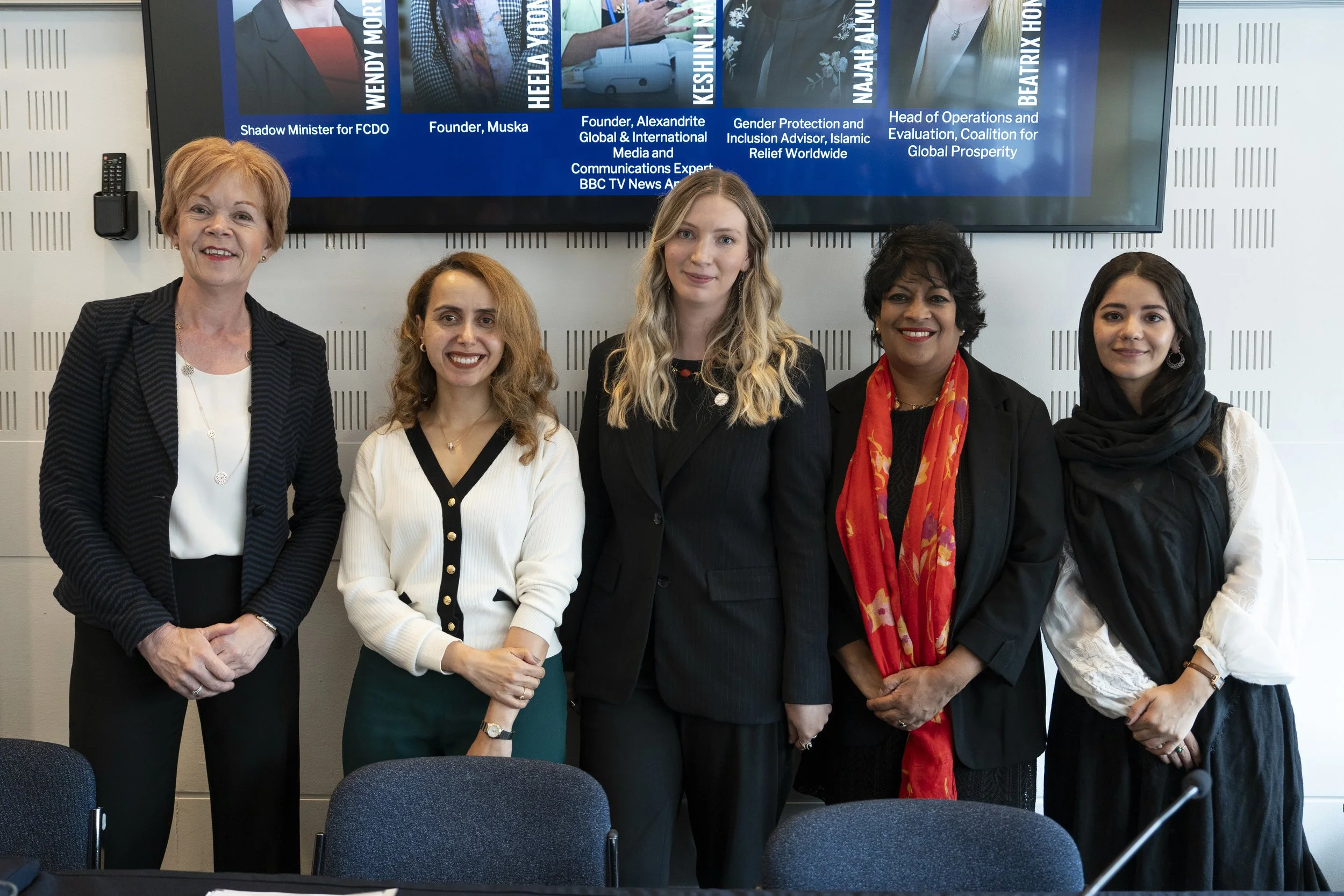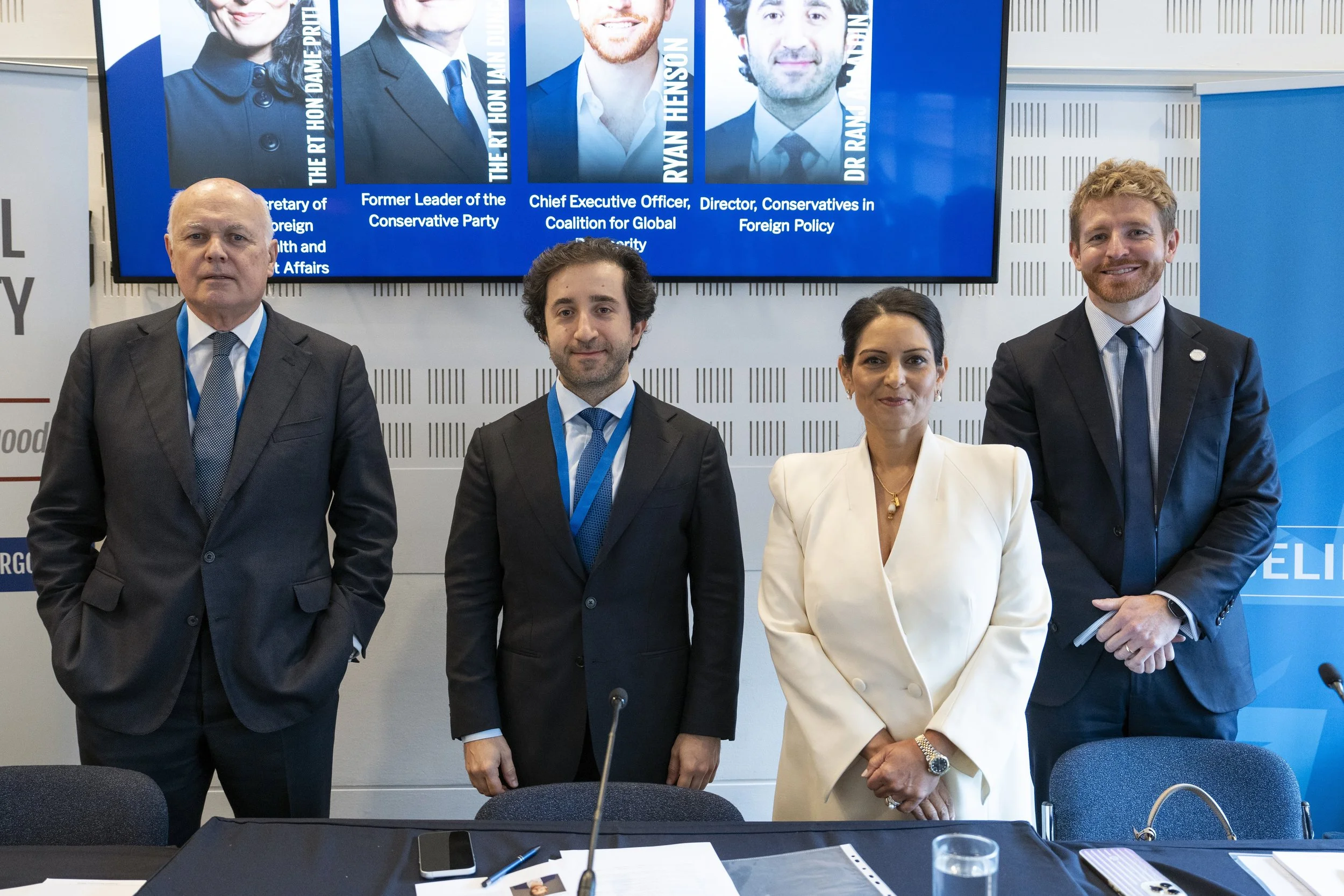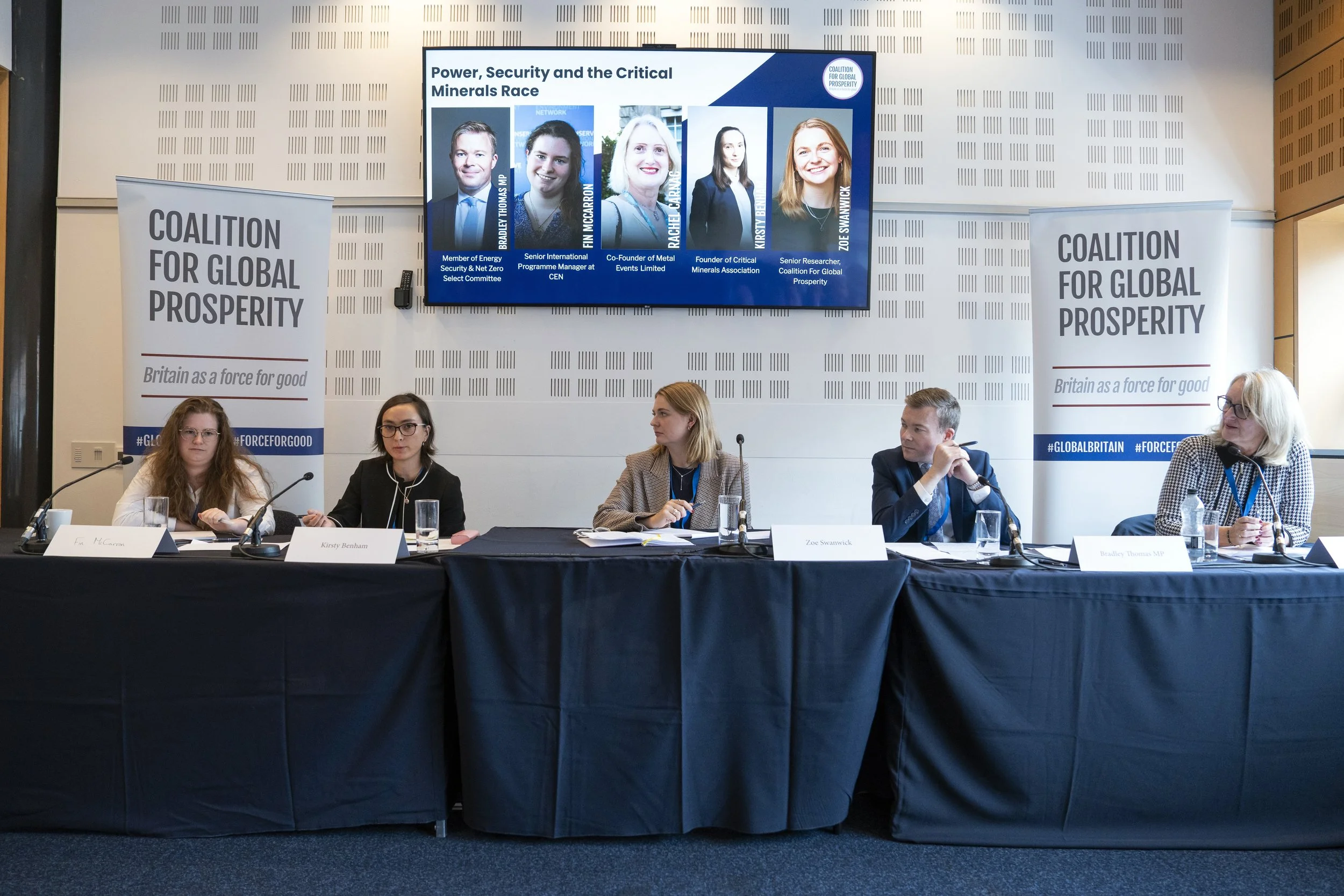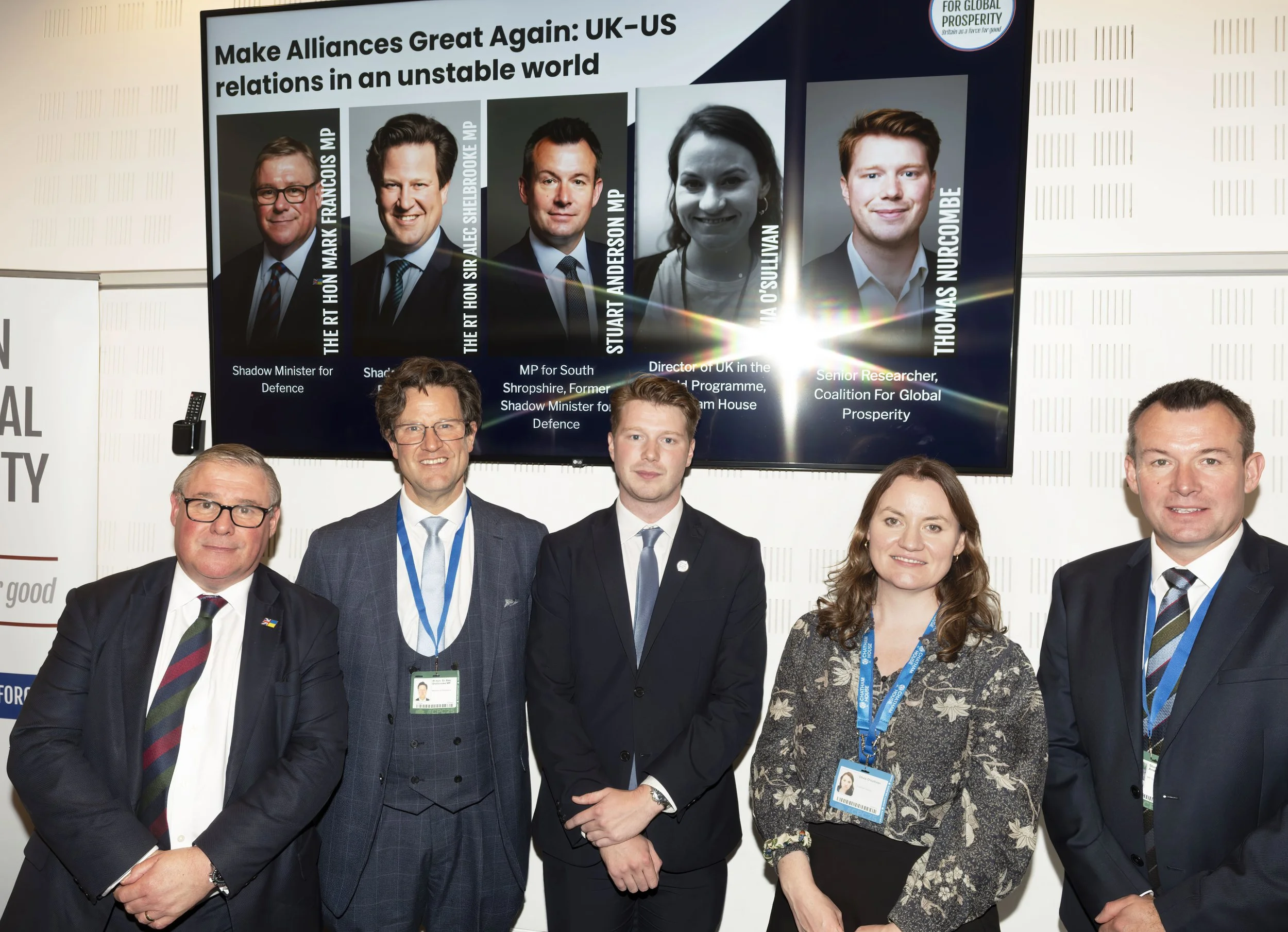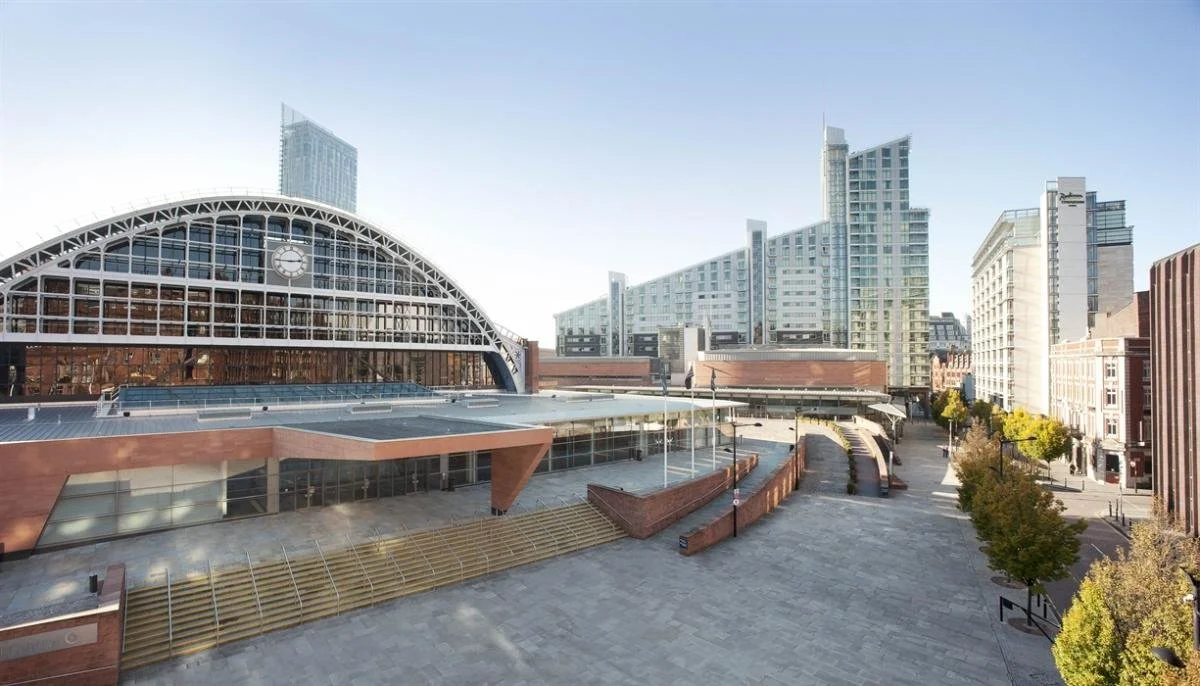
CGP at Conservative Party Conference 2025
From 5th - 8th October, the Coalition for Global Prosperity hosted a comprehensive programme of panels, discussions, and receptions at the Conservative Party Conference in Manchester, examining how Britain can lead globally through defence, development, and diplomacy in an increasingly volatile world.
The week opened with ‘Can UK Aid Stop the Boats?’, where The Rt Hon Sir Andrew Mitchell KCMG MP, The Rt Hon Nadhim Zahawi, Dr Ranj Alaaldin, and Resham Kotecha explored how aid can tackle the root causes of irregular migration. The panel agreed that migration cannot be solved in isolation, with Sir Andrew Mitchell calling for a new “Marshall Plan” to build global partnerships, and Nadhim Zahawi advocating a three-pronged strategy uniting defence, diplomacy and development. Dr Alaaldin warned that aid is too often trapped in bureaucracy, while Resham Kotecha emphasised the importance of long-term planning and lessons from India’s development success story.
Later that day, ‘From Diplomacy to Drama: Is Soft Power a Worthwhile Investment in a Volatile Era?’ brought together Major General (Retd) James Cowan, Aphra Brandreth MP, David Reed MP, and Patrick Stevens to discuss whether Britain can afford not to invest in soft power. Speakers agreed that hard and soft power are two sides of the same coin. James Cowan warned against “turning inward” and abandoning Britain’s international leadership role, while Aphra Brandreth highlighted that prevention and diplomacy remain the most cost-effective tools for national security. Patrick Stevens called for greater pragmatism in using existing British institutions, from the BBC World Service to the rule of law, as levers of influence.
At ‘Life Under the Taliban: Is Britain Failing Afghanistan’s Women and Girls?’, The Rt Hon Wendy Morton MP, Keshini Navaratnam, Heela Yoon, and Najah Almugahed shared powerful testimony on the collapse of women’s rights under Taliban rule. Speakers described how access to education, healthcare and work has been stripped away since 2021. Heela Yoon warned that denying education “breeds extremism and poverty,” while Wedny Morton called for the UK to use its diplomatic leverage to restore opportunity and accountability.
CGP then hosted ‘In Conversation with The Rt Hon Dame Priti Patel DBE MP’, where the Shadow Foreign Secretary reflected on her time at DFID and set out her vision for Britain’s role in the world. Dame Priti Patel argued for aligning aid more closely with national security, reforming multilateral institutions, and adopting a “ladder of opportunity” approach to development. She warned of the risks of foreign interference at home and called for “a backbone of steel” in confronting authoritarian regimes, while reaffirming the enduring strength of the UK-US relationship.
The discussion turned to Europe’s frontline in ‘Sanctions, Storm Shadow and Strategy: What the UK Can Learn from the War in Ukraine’. Lincoln Jopp MC MP, Aliona Hlivco, The Rt Hon Sir John Whittingdale OBE MP, and Megan Gittoes examined lessons from Ukraine’s defence, from sanctions to modern deterrence. Lincoln Jopp warned that Britain must “prepare the nation for what may lie ahead,” while Sir John Whittingdale emphasised the need to strengthen both hard and soft power. Hlivco cautioned that “Europe is losing key fronts” in technological warfare, and Megan Gittoes called for greater investment in open-source intelligence and humanitarian protection.
In the evening, we hosted a private dinner focused on how the next generation of Conservative politicians and thinkers can mobilise defence, development and diplomacy within their approach to foreign policy.
The dinner brought together members of CGP’s 2023 and 2025 Future Leaders cohorts, alongside senior figures from across the Conservative Party, with The Rt Hon Dame Penny Mordaunt DBE and Major General (Retd) James Cowan CBE DSO in attendance as guest speakers.
Opening remarks underlined the importance of integrating defence, development and diplomacy to maintain a stable and secure global order at a time when soft power is being significantly undermined. The conversation explored how government priorities have shifted from building equitable partnerships with developing nations towards meeting departmental targets — a change that, it was argued, leaves less space for soft power and people-centred policy.
Participants reflected on how pride in Britain’s identity can be strengthened through better storytelling of our past achievements on the world stage. By championing the UK’s record in post-conflict reconstruction and institution-building, a new generation of parliamentarians can better understand the strategic value of soft power.
However, it was clear that diplomacy cannot operate in isolation. To be effective, it must work alongside other pillars of British foreign policy — from pre- and post-conflict engagement to development finance and trade — to build stronger, more resilient partnerships across the world stage.
Day one closed with ‘Britain’s Global Future: Renewing Leadership on International and Coastal Development’, a late-night reception featuring The Rt Hon Dame Penny Mordaunt DBE as guest speaker. The event brought together parliamentarians, campaigners and NGOs to celebrate Britain’s leadership in championing sustainable development and coastal resilience — both vital to global prosperity and national pride.
Can UK Aid Help Stop the Boats?
Hosted by the Coalition for Global Prosperity and Conservatives in Foreign Policy
The Government wants to tackle irregular migration by addressing the root causes at the source. Research shows that, when deployed strategically, especially through investment in education and infrastructure, aid can reduce migration. This panel will explore the effectiveness of this strategy and thus examine the interplay between aid, foreign policy and national security.
In Conversation with The Rt Hon Dame Priti Patel MP
An ‘In Conversation with’ event with The Rt Hon Dame Priti Patel DBE MP that explored Britain’s role in the world today. This conversation covered how the UK can promote and defend our interests in the decade ahead, and where the priorities of the next Conservative government should lie.
Make Alliances Great Again: UK-US Relations in an Unstable World
President Trump’s return to power has introduced profound uncertainty for UK-US relations. The “special relationship” has been rooted in military cooperation, intelligence-sharing, and diplomatic alignment; the divergence between the UK and the US on global issues requires Britain to recalibrate its approach to transatlantic relations. This panel examined how the UK can mitigate risks and maintain its strategic influence, amid Trump’s presidency.
Sanctions, Storm Shadow and Strategy: What the UK Can Learn from the War in Ukraine
The war in Ukraine has reshaped the geopolitical landscape, highlighting critical lessons for the United Kingdom and its allies. From the effectiveness of economic sanctions to the strategic impact of advanced weaponry, the conflict has redefined modern warfare, deterrence, and defence policy. This panel explores how the UK can adapt its preparedness for modern conflict and continue to support Ukraine during the war and beyond.
At ‘Beyond Charity: A Conservative Aid Budget for the 2030s’, Elliot Keck, Resham Kotecha, Ryan Shorthouse, and Victoria Fowler debated how the Conservative Party can reshape the UK’s aid strategy for the decade ahead. Speakers discussed making aid slimmer, smarter, and more accountable — focusing on measurable results and global health innovation. Victoria Fowler argued that the UK should “be guided by what’s right” and maintain ambition on malaria eradication, while Ryan Shorthouse called for conditional, targeted aid that promotes sustainability and entrepreneurship.
In ‘Axis of Authoritarianism: Can Britain Confront Threats to the Global Order?’, Chaired by Dr Ranj Alaaldin, Director of Conservatives in Foreign Policy, The Rt Hon Dame Priti Patel DBE MP, The Rt Hon Sir Iain Duncan Smith MP, and Ryan Henson examined how the UK can respond to the growing coordination between autocratic states. Dame Priti Patel linked the “axis of authoritarianism” to Iran-backed aggression in the Middle East, Sir Iain Duncan Smith warned that “we are losing before we’ve begun to fight,” and Ryan Henson underlined that Britain’s development budget remains one of its strongest tools for building alliances and demonstrating reliability to partners across the world.
Economic resilience was the focus of ‘Power, Security and the Critical Minerals Race’, featuring Bradley Thomas MP, Rachel Carnac, Kirsty Benham, and Fin McCarron. The panel explored how the UK can secure access to vital resources underpinning clean energy and defence industries. Speakers highlighted the importance of innovation, recycling, and de-risking supply chains through development partnerships. Bradley Thomas noted that critical minerals “affect everyone — from iPhones to solar panels,” while Kirsty Benham and Rachel Carnac urged a cross-government approach to strengthen domestic capacity.
Global health took centre stage at ‘No One Left Behind: Funding the Final Fight to End HIV by 2030’, co-hosted with LGBT+ Conservatives. Dr Ben Spencer MP, Mike Podmore, Andrew Boff, and Melanie Scagliarini examined how aid cuts have endangered progress against HIV and other preventable diseases. Dr Ben Spencer argued that Conservatives “must be present in global health conversations,” while Mike Podmore warned that progress “has stalled due to financial uncertainty.” Panellists agreed that resilient healthcare systems are essential to prevent future pandemics and meet the UNAIDS 2030 target.
At ‘Make Alliances Great Again: UK–US Relations in an Unstable World’, Stuart Anderson MP, The Rt Hon Sir Alec Shelbrooke KBE MP, Olivia O’Sullivan, and The Rt Hon Mark Francois MP discussed the future of the transatlantic alliance amid shifting US priorities. Speakers highlighted the enduring importance of shared defence commitments and intelligence cooperation, but acknowledged growing divergence on multilateralism and climate policy. Sir Alec Shelbrooke warned that “we must take off our rose-tinted glasses” and adopt a more strategic approach to the relationship, while Olivia O’Sullivan noted the reputational cost of Western aid cuts to allies abroad.
Across two days, CGP’s events underscored a consistent message: that Britain is strongest when it leads — when it uses aid, diplomacy and defence together to advance security, prosperity, and freedom across the world.

